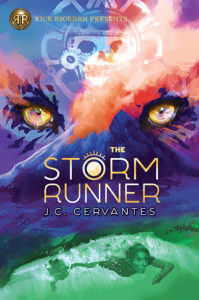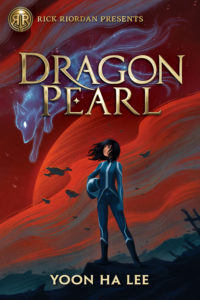Three new series bearing the Rick Riordan name share an interest in pagan deities and a neo-pagan worldview.

When Rick Riordan introduced his signature character, Percy Jackson, over a decade ago, he immediately established himself as a one of the best-selling authors ever in the category of middle-grade fantasy. Percy Jackson, as every parent of a 12-year-old should know, is the son of a mortal mother and the Greek god Poseidon. In volume one (The Lightning Thief), he discovers his patrimony and learns he’s responsible for saving the world. His world-saving adventures continue throughout the Percy Jackson and the Olympians series, then the Heroes of Olympus series (which incorporates Roman gods along with the Greek) and the Trials of Apollo series. In between all those best-selling titles, Riordan explored the Egyptian Pantheon with the Kane Chronicles and is currently in the middle of a series based on Norse mythology, featuring the central character Magnus Chase.
At Redeemed Reader we reviewed Percy Jackson and the Olympians very favorably: the books were original, funny, exciting, engaging, and packed with lots of mythological and historical information. With subsequent series our enthusiasm dimmed as language and violence issues increased, along with Riordan’s apparent calling to evangelize for homosexuality and gender-fluidity. We’ve discussed these problems before, and they’re not the point of this post. Rather, it’s something I wondered about in the earliest Percy Jackson books: in the basic premise of gods still inhabiting Mt. Olympus and messing with events on earth, what’s the place of Christianity?
It didn’t seem to have a place, even though Riordan (at least in the early books) was a big fan of Western civilization–to which Greek culture contributed, of course. But a much greater contribution came from Palestine in the first century. In Sea of Monsters (vol. 2), I picked up some interesting hints that Riordan might make a nod in that direction . . . but no. In Percy Jackson’s world, and Magnus Chase’s world, and the Kane Kids’ world, Jesus never existed. The Word that “turned the world upside down” was never spoken.

Expanding the Empire

Meanwhile, there are too many mythologies to be exploited by just one writer, so here comes “Rick Riordan Presents,” a series of novels by authors who create adventures around other ethnic legends and world religions. Aru Shah and the End of Time is volume one of the Pandava series, featuring Hindu mythology. The Storm Runner, due in September, is about an ordinary 13-year-old Mexican kid who meets a Mayan fire goddess at his backyard volcano. Dragon Pearl, also debuting this fall, is a sci-fi adventure that draws on Korean deities. All these, and doubtless more to come, proudly bear the “Rick Riordan” label and all are built on some form of pagan or polytheistic religion.
We’ll post a review of Aru Shah within the next few weeks, but in the meantime it’s safe to presume that all of the Rick Riordan Presents novels are fun, exciting, and educational. But some of them may also be subversive, in the way that some of the later Percy Jackson/Magnus Chase books are. Though the reader is not meant to take pagan deities seriously, the theme of acceptance, tolerance and equality of all worldviews grows naturally out of a neo-pagan disposition.
Note: this has nothing to do with the original, ancient-world paganism. That was false, but at least it was serious—dead-serious. In Orthodoxy, G. K. Chesterton corrects a common assumption of the modern world: that the gods of Olympus and Asgard were worshipped with innocent joy while Yahweh and his self-sacrificing Son introduced gloom and sin. The truth is just the opposite:
To the pagan the small things are as sweet as the small brooks breaking out of the mountain; but the broad things are as bitter as the sea. When the pagan looks at the very core of the cosmos he is struck cold. Behind the gods, who are merely despotic, sit the fates, who are deadly. Nay, the fates are worse than deadly; they are dead.
With Christ came the news that the universe was not cold and hostile but alive and welcoming; “You have come,” as the writer of Hebrews says,
to Mount Zion and to the city of the living God, the heavenly Jerusalem, and to innumerable angels in festal gathering, and to the assembly of the firstborn who are enrolled in heaven, and to God, the judge of all, and to the spirits of the righteous made perfect, and to Jesus . . . . (Heb. 12:22-24)
The drama and excitement of Rick Riordan’s worlds are the drama and excitement of small things, of this world things where battles are never over. Modern-day paganism snatches plotlines from classic mythology and themes from contemporary virtue, but doesn’t ponder death and guilt. That’s because there is no answer to death and guilt outside of Christ. Percy Jackson and his friends will always struggle with the gods, because it’s all about the fight, not about resolution and reconciliation.

If the authors aren’t Christians, naturally they won’t write from a Christian point of view. A young reader can enjoy these books but should understand what they profoundly lack. Their subversiveness may not be intentional; authors write out of their own understanding, and neo-paganism is in the air these days. To the extent that Aru Shah and her peers help to broaden a reader’s understanding of other cultures, they can be worthwhile companions. But readers should recognize when faith in Christ is being undermined, even if it’s assumed he never existed.
Support our writers and help keep Redeemed Reader ad-free by joining the Redeemed Reader Fellowship.
Stay Up to Date!
Get the information you need to make wise choices about books for your children and teens.
Our weekly newsletter includes our latest reviews, related links from around the web, a featured book list, book trivia, and more. We never sell your information. You may unsubscribe at any time.
We'd love to hear from you!
Our comments are now limited to our members (both Silver and Golden Key). Members, you just need to log in with your normal log-in credentials!
Not a member yet? You can join the Silver Key ($2.99/month) for a free 2-week trial. Cancel at any time. Find out more about membership here.
16 Comments
Leave a Comment
You must be logged in to post a comment.


First of all, and this is a Christian Pagan writing out this meaningless comment, you really need to educate yourself on the christianization of Europe. It is true to acknowledge violence and intolerance on both sides, not just on the Pagan side, not just on the Christian side. And secondly, you’d be AMAZED at how real multiple Gods are and they do and can coexist with God. I don’t want people like you or Rick Riordan messing around with your “love for mythology” if you are going to have this intolerance towards very real, alive religions. Paganism is a bigger religion than you think it is, just because you don’t see us (or polytheist who combine religions) does not mean we don’t exist. Educate yourself. Stop throwing garbage out into the universe just because you thought no one would read it. What even was the point of the article?
Al, it seems to me you’re making a lot of assumptions here. I’m aware that paganism is still around today, but neo-paganism is not the same as ancient paganism. As to the existence of multiple gods, I accept the testimony of the Bible that supernatural beings exist apart from the material world. I just wouldn’t call them “gods,” and I reject that they’re anywhere on a level with the triune God of Christianity. Jesus is the only who said, “No one can come to the Father except by me,” which definitively excludes other so-called deities and spirits. I’m sticking with him, who died for me in order that I might come to God (THE God). (And yes, I am aware that other mythologies include gods who die in order to provide some benefit to mankind, but as C. S. Lewis says, Christianity is the only faith that gives the story a historical context–in other words, the only time it actually happened.)
I really admire your reply to AI, every other ‘god’ is a false god and the embodiment of demons. Paganism is plainly idolatry and cannot be further debated upon, The only true God is ‘Yahweh’, The Sole Creator and Author of the Universe, by His Son and His Holy Spirit that is the only true Three-in-one God.
Apollo mentions Jesus when he says “I was supposed to fight Jesus but He never shoed up”
Excellent post!
Chiron literally addresses the idea of the Christian God when Percy directly asks about it. He tells him that they won’t deal in the metaphysical. Please, know your source material. It is addressed and left at that for the purposes of the story.
The only two series I like of Riordan’s are the Percy Jackson Series and Heroes of Olympus. I like reading about mythology. However, as a Christian, I see it merely as entertainment. I don’t take ANY of it seriously. It’s just some good vs. evil fun.
Hi! I’m not at all familiar with these books. They’re definitely not my preferred genre; however, my kids’ book club is reading Aru Shah and the End of time next month. Because we are a Christian family, I’ve been searching for book reviews by other Christians. Your website is the first and only I’ve been able to find–at least in regards to this particular book. I see that it was mentioned that a review for Aru Shah would be added to your site, but I can’t locate it. Can you please let me know your thoughts on whether or not this book is appropriate for 11- and 13-year old Christian children? I’d really appreciate some insight into this. Thank you!
Cami, it looks like we don’t have that review of Aru Shah available. Thanks for bringing that to our attention! I’ll check with the team and see who read it. ~Betsy
Hi Betsy, I’m still waiting on a response about the book review on Abu Shah that you were looking into. It’s been almost a year. My daughter was recently given this book from our schools PTA however I would like to have some more in depth insight about it before deciding if she is allowed to read it or not. Thanks for any info you can provide!
Hey there —I’m afraid that’s my bad for letting a review slip through the cracks. I’ve read the first book in the Aru Shah series, and it’s similar to Percy Jackson in its themes/way of introducing a new mythology, but it does have an added minor LGBTQ element in a character’s sibling. We do need to add a review; thank you for the reminder!
I, too, would very much appreciate a review on Abu Shah. Thanks.
‘The Nephilim were on the earth in those days – and also afterwards – when the sons of God went to the daughters of men and had children by them. They were the heroes of old, men of renown.’ (Genesis Chapter 6:4). More often than not it’s just easier to shrug our shoulders and move on to the story of Noah and his family. But the questions remain all the same: Who are these “sons of God” and their Nephilim (literally, “the fallen ones”) children, and why would the author of Genesis choose to mention them at all? Sounds like Greek myth, or perhaps a Norse legend, or maybe a folktale from Africa or India. Surely the story of ‘demi-gods’ and giants couldn’t come from the sacred scriptures of Judaism and Christianity. Or could it? In fact, it is one of the seldom-told stories in the Hebrew Bible.
Jane: plenty of Bible scholars have pondered this puzzling passage (unconscious alliteration, there) and come to various interpretations. It’s not that the Nephilim have been ignored. I wouldn’t put them in the same class as the mythical characters of polytheism.
My daughter recieved Dragon Pearl by Yoon Ha Lee last year for her 10th birthday from a well-meaning, if uninformed relative last April. It was in a big stack of books, and I did try to screen them using Redeemed Reader reviews. Most of the stack seemed acceptable, even if it wasn’t what I would choose. My daughter came to me with concern because she stumbled on a major character using “they/them” pronouns, clearly understood to be “non-binary.” I hope this helps someone else! I think these Riordan spinoffs should probably be avoided for their pagan worldview and also the gender perspective pushed on the reader.
Thank you for that insight, Grete. I began listening to an audio version of Dragon Pearl but didn’t have time to finish it, and didn’t find the story appealing in any case. We can probably expect more “paganish” stories as the push for more and more diversity uncovers more and more obscure mythology.